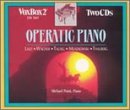| All Artists: Franz Liszt, Carl Tausig, Moritz Moszkowski, Percy Grainger, Louis Brassin, Sigismund Thalberg, Paul Pabst, Michael Ponti Title: Operatic Piano Members Wishing: 0 Total Copies: 0 Label: Vox (Classical) Release Date: 11/4/1992 Genres: Special Interest, Classical Styles: Opera & Classical Vocal, Forms & Genres, Fantasies Number of Discs: 2 SwapaCD Credits: 2 UPC: 047163504723 |
Search - Franz Liszt, Carl Tausig, Moritz Moszkowski :: Operatic Piano
 | Franz Liszt, Carl Tausig, Moritz Moszkowski Operatic Piano Genres: Special Interest, Classical
|
Larger Image |
CD Details |
CD ReviewsExtraordinary rarities played with flawless virtuosity - 6 s Hexameron | 02/27/2007 (5 out of 5 stars) "To some, the Vox label might seem like a mixed bag. At their best, they pump out some excellent and invaluable recordings (Brendel's Beethoven Variations and Vignettes, Ponti's Romantic Piano Concerti). At their worst, they churn out some questionable and shoddy series (the 25 favorites). But after listening to this particular recording, I'm convinced it's simply one of their best releases. Operatic transcriptions and paraphrases, despite what some may think, are actually some of the most virtuosic and melodious piano works of the 19th century. Such paraphrases/fantasies from pianist-composers like Liszt and Thalberg actually showcase a remarkable skill with composition. These fantasies/paraphrases should really be appreciated more; they're not mediocre potpourris. Every single work featured here is of high quality, especially when considering all of the Leybach, Herz, Moscheles, and Ketterer sub-par fantasies out there (most never recorded). Furthermore, Michael Ponti's pianistic arsenal of violent attacks and sublime dynamics make for a satisfying and highly invigorating performance. For those who aren't new to operatic fantasy/transcription recordings, you'll surely notice the strange pairings of pieces here. On the one hand, we get famous war-horses like Liszt's Reminiscences de Don Juan, Paraphrase on Rigoletto, and some of the standard Wagner transcriptions. And in between we find some unjustified obscurities: Tausig's marvelous Fantasy on Moniuszko's Halka, Thalberg's two grandiose fantasies on Meyerbeer operas, and an exquisite Pabst Tchaikovsky paraphrase. As much as I have the desire to critique and praise each one of these works, it would simply make this review too long. However, there are rarities here that deserve special mention. Tausig's Fantasy on Halka is something I had never heard before and it left me breathless on a first hearing. Tausig was indeed a composer of budding genius and his death deprived the late 19th century of a great artist. This Tausig Fantasy is the most engaging pianistic tour-de-force I've heard in a long time. Tenderness, melancholy, majesty, excitement: this Liszt-inspired fantasy has got it all. In my view, it's the most original operatic fantasy I've heard after Liszt. Tausig's Ride of the Valkyries is also noteworthy for providing a spectacular example of the piano's ability to imitate orchestral textures. I prefer Brassin's transcription of it, though, recorded by Chitose Okashiro. And speaking of Brassin, his Feuerzauber is a magnificent tapestry of Wagner's glorious music. I might remark on Ponti's fantastic technique with the gushing arpeggios and his elevated musicality in the central passagework. Sigismond Thalberg has never been taken seriously as a composer, which is sad. I find his operatic fantasies some of the most well-constructed and inventive after Liszt. He's not just filling 10-20 minutes with a random deluge of notes: the Robert le Diable and Les Huguenots fantasies are a gorgeous kaleidoscope of themes quite skillfully linked together. Thalberg's embellishments and ornamentations go beyond simple trills. They are flashy, yes, but they take many guises: at times they can be refined and tasteful like Mendelssohn, intricate like Chopin, or dramatic like Liszt. Thalberg has a knack for picking the "good" operatic themes, too. Therefore his fantasies never bore. Moving on, Grainger's Paraphrase on Tchaikovsky's Waltz of the Flowers is impossible to dislike; the dense piano textures only intensify this splendid music. Moszkowski's transcription of Wagner's Liebestod is almost as good as Liszt's. I'll always prefer Liszt's climactic ending, however: he employs passionate tremolos in the guttural bass and the wailing higher registers. Moszkowski's choice of sweeping arpeggios may not match Liszt's overwhelming grandeur, but Ponti's passionate delivery is on such a level that the music retains just as much of an emotional impact as Liszt's own arrangement. Moszkowski's Barcarolle from Offenbach's Tales of Hoffmann is another exceptional performance from Ponti. Ponti lets his muscular brio subside for this delicate and warm music. It seems strange not to mention Liszt's contributions, but I suppose it's because I've heard these from other recordings. I can only comment that Ponti's Don Juan and Rigoletto are top-notch and spirited. Those who are intimate with other interpretations may have a problem with Ponti's tempo or phrasing; he's not quite up to par with Bolet, though, the supreme interpreter of Liszt's fantasies. Bottom line: Every single piece on this recording is of premium quality, consisting of stunning, melodious, and highly dramatic music. Additionally, some of these works, like Tausig's and Thalberg's fantasies, cannot be found on other recordings. Michael Ponti's virtuosity is mind-blowing and his interpretations are no less impressive. I also can't believe the budget price since this is a 2-CD set. I encourage all pianophiles to buy this while Amazon still offers it." Bravura performances! Hiram Gomez Pardo | Valencia, Venezuela | 11/22/2006 (5 out of 5 stars) "Despite of the fact there is a lot of people who refuse the transcriptions genre, we never should forget this device had sense in those ages, when the musical culture was relatively limited for minuscule elite.
So, in this sense, the transcriptions were a formidable tool for young musicians, piano teachers and all kind of lover's music who simply lived miles away from the Great Concerto Halls. Nevertheless, those performances possess that energetic vitality that compenstaes by far all your prejudices. Go for these ones." |

 Track Listings (8) - Disc #1
Track Listings (8) - Disc #1